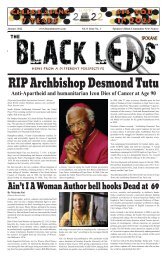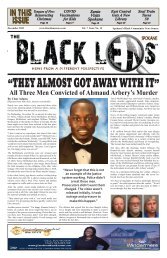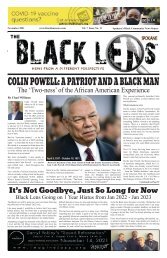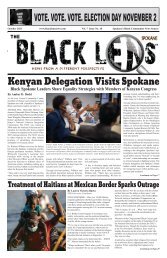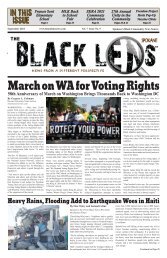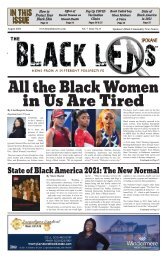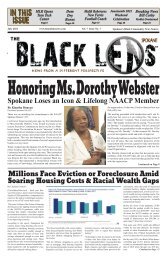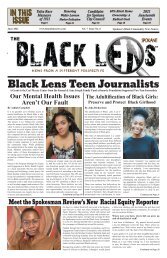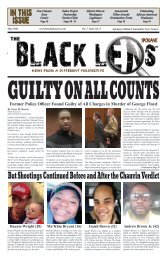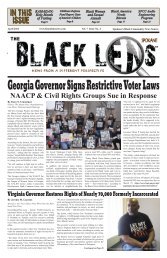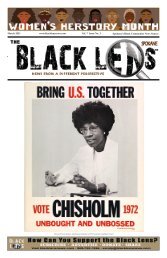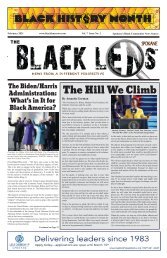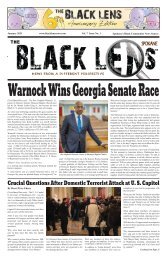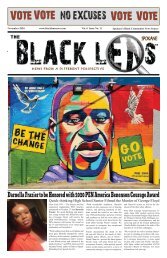Black Lens March 2020
The Black Lens is an independent community newspaper based in Spokane WA that is focused on the news, issues, events and people of importance to the Black community.
The Black Lens is an independent community newspaper based in Spokane WA that is focused on the news, issues, events and people of importance to the Black community.
You also want an ePaper? Increase the reach of your titles
YUMPU automatically turns print PDFs into web optimized ePapers that Google loves.
The <strong>Black</strong> <strong>Lens</strong> Spokane<br />
www.blacklensnews.com <strong>March</strong> <strong>2020</strong><br />
Page 7<br />
BLACK NEWS HIGHLIGHTS<br />
Local, State, National and Around the World<br />
(Source: nasa.gov; Dana Givens, blackenterprise.com;<br />
Britni Danielle, theroot.com;<br />
Photos courtesy: NASA)<br />
Katherine G. Johnson, the African American<br />
NASA mathematician, whose story<br />
was featured in the 2016 film Hidden Figures,<br />
died Monday, February 24. She was<br />
101 years old.<br />
In a statement, NASA said: " Ms. Johnson<br />
helped our nation enlarge the frontiers of<br />
space even as she made huge strides that<br />
also opened doors for women and people<br />
of color in the universal human quest<br />
to explore space. Her dedication and skill<br />
as a mathematician helped put humans on<br />
the moon and before that made it possible<br />
for our astronauts to take the first steps in<br />
space that we now follow on a journey to<br />
Mars. Her Presidential Medal of Freedom<br />
was a well-deserved recognition. At NASA<br />
we will never forget her courage and leadership<br />
and the milestones we could not have<br />
reached without her. We will continue building<br />
on her legacy and work tirelessly to increase<br />
opportunities for everyone who has<br />
something to contribute toward the ongoing<br />
work of raising the bar of human potential.”<br />
Born in 1918 in White Sulphur Springs,<br />
West Virginia, Johnson was a research<br />
mathematician, who by her own admission,<br />
was simply fascinated by numbers. By the<br />
time she was 10 years old, Johnson was a<br />
high school freshman--a truly amazing feat<br />
in an era when school for African-Americans<br />
normally stopped at eighth grade.<br />
Johnson's father drove his family 120<br />
miles to Institute, West Virginia, so that<br />
his daughter could continue her education<br />
through high school. She skipped grades to<br />
graduate from high school at age 14, and<br />
from college at age 18.<br />
In 1953, after years as a teacher and later as<br />
a stay-at-home mom, Johnson began working<br />
for NASA's predecessor, the National<br />
Advisory Committee for Aeronautics, or<br />
NACA. The NACA had taken the unusual<br />
step of hiring women for the tedious and<br />
precise work of measuring and calculating<br />
the results of wind tunnel tests in 1935.<br />
In a time before the electronic computers<br />
that we know today, these women had the<br />
job title of “computer.” During World<br />
War II, the NACA expanded this effort to<br />
NASA "Hidden Figures" Mathematician Katherine G. Johnson Dies at 101<br />
include African-American women. The<br />
NACA was so pleased with the results that,<br />
unlike many organizations, they kept the<br />
women computers at work after the war.<br />
By 1953 the growing demands of early<br />
space research meant there were openings<br />
for African-American computers at<br />
Langley Research Center’s Guidance and<br />
Navigation Department – and Katherine<br />
Johnson found the perfect place to put her<br />
extraordinary mathematical skills to work.<br />
As a computer, Johnson calculated the trajectory<br />
for Alan Shepard, the first American<br />
in space. Even after NASA began<br />
using electronic computers, John Glenn<br />
requested that she personally recheck the<br />
calculations made by the new electronic<br />
computers before his flight aboard Friendship<br />
7 – the mission on which he became<br />
the first American to orbit the Earth.<br />
Johnson continued to work at NASA until<br />
1986, combining her math talent with<br />
electronic computer skills. Her calculations<br />
proved as critical to the success of<br />
the Apollo Moon landing program and<br />
the start of the Space Shuttle program, as<br />
they did to those first steps on the country's<br />
journey into space.<br />
On November 24, 2015, Johnson received<br />
the nation's highest civilian award, the<br />
Presidential Medal of Freedom, from President<br />
Barack H. Obama. NASA also named<br />
the Computational Research Facility in<br />
Johnson's honor.<br />
“In her 33 years at NASA,” President<br />
Obama said, “[Johnson] broke the barriers<br />
of race and gender, showing generations of<br />
young people that everyone can excel in<br />
math and science and reach for the stars.”<br />
Lanequa (Nikki) Jones Competes for Miss Spokane<br />
Lanequa Jones, also known by her friends and family as<br />
Nikki, joined nineteen other women on Sunday, February<br />
16, to compete for Miss Spokane.<br />
Miss Spokane and Miss Spokane’s Outstanding Teen are<br />
local preliminaries to the Miss America and Miss America’s<br />
Outstanding Teen Competitions, which are the nation’s<br />
largest providers of scholarships to young women.<br />
Each year, 20-25 young women representing titles from<br />
around the state compete for scholarships, prizes and the<br />
chance to represent Washington in the Miss America competition.<br />
Competing in the Miss Spokane competition was no<br />
small accomplishment for Nikki. She was born and raised<br />
in Pine Bluff, Arkansas, but family tragedy brought her<br />
to Spokane fifteen years ago to live with her<br />
grandparents.<br />
Despite the challenges, Nikki has a long list<br />
of accomplishments. She graduated from high<br />
school, started college as a College Success<br />
Foundation Scholar, went to the state Track &<br />
Field championship 4 years in a row and even<br />
had the opportunity to run in the Jr. Olympic<br />
Games,<br />
Nikki competed for Miss Spokane with mental<br />
health/illness awareness as her platform,<br />
pointing out that Spokane has a higher rate<br />
of mental health issues than the state average.<br />
Something Nikki says, "troubles me deeply, as<br />
it would anyone who cares about the improvement<br />
of mental health within our community."<br />
Judges this year included Spokane City Councilwoman<br />
Betsy Wilkerson, former titleholder<br />
Erin Regrutto and Gonzaga University Assistant<br />
Dean Colleen Quinn Vandenboom.<br />
Unfortunately, Nikki was not crowned Miss<br />
Spokane <strong>2020</strong> in this year's competition, that<br />
honor went to Gabby Dansereau (21), but she<br />
is not letting that or anything else deter her.<br />
In speaking about her childhood, Nikki says,<br />
"It was rough and filled with sadness, but I had<br />
a strong mother who made sure that this woman<br />
standing in front of you had room to dream<br />
and grow. For information visit: missspokane.org



